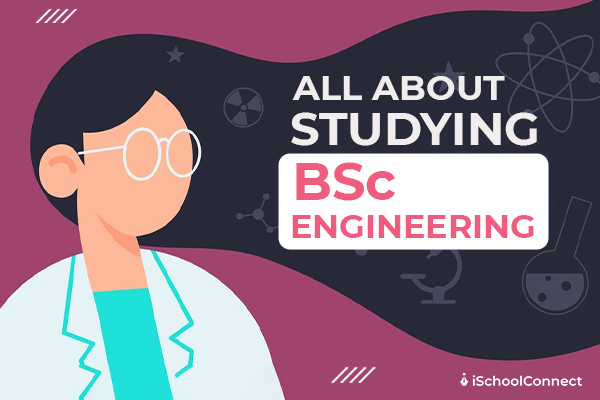Table of Contents
- What is BSc Engineering?
- BSc Engineering | What does the course consist of?
- BSc Engineering | Advantages of pursuing the degree
- Eligibility criteria for pursuing the degree
- BSc Engineering | Required skills
- Top colleges for BSc Engineering
- Bachelors of Science Engineering | Job opportunities
- Bachelors of Science in Engineering | Job profiles
- BSc Engineering | Course highlights
- Key takeaways
- FAQs
What is BSc Engineering?
BSc Engineering is an undergraduate degree program that gives a comprehensive overview of all branches of engineering. It trains students in different areas of engineering by teaching fundamental engineering principles and techniques with their modern-day applicability. A BSc degree offers theoretical and practical coursework in various engineering disciplines with a scientific perspective. Some of the disciplines of engineering include –
- Industrial Technology
- Chemical Engineering
- Electrical Engineering
- Mechanical Engineering
- Engineering Management
- Civil and Structural Engineering
- Industrial Automation Engineering
- Fire Protection and Safety Engineering Technology
As you prepare yourself to embark on your new academic journey as a college student, arm yourself with the knowledge of Everything the course has to offer. From the advantages of the course to job opportunities available after BSc Engineering, we’ve listed them all for you. Keep reading to find out more!
BSc Engineering | What does the course consist of?
BSc Engineering takes a multidisciplinary perspective, covering different fields of engineering. These include electrical, systems engineering, mechanical, and aeronautical engineering. During the BSc Engineering degree, students learn several practical skills such as data analysis, computer programming, scientific reporting, technical writing, and so on. In addition to this, a few study subjects include physics, chemistry, thermodynamics, calculus, algebra, numerical analysis, etc.
BSc Engineering | Advantages of pursuing the degree
As a matter of fact, engineering is a highly competitive field. But if you manage to perform well in your studies, the opportunities and rewards are endless. Consider the following, for example –
#1. Bright career prospects
With growing innovation and developments in the tech space, job opportunities for fresh graduates are looking extremely bright. Digitalization is gripping the imagination of companies across industries, and job roles are changing at a rapid pace.
#2. High-paying jobs
Engineering students invest a lot in their time, energy, and course fees. The return on investment is, therefore, huge for BSc Engineering graduates. With an increasing demand for them in the workplace, the starting salaries are higher than most other graduates.
#3. Scope for further education
You can go on to pursue several lucrative master’s level courses after completion of your undergraduate program. Some of these courses include MSc Engineering, MBA in Data Science, IT, or Cloud Computing, Master of Computer Applications (MCA), Artificial Intelligence or Machine Learning, and so on.
Eligibility criteria for pursuing the degree
All in all, eligibility criteria vary from university to university. However, it is essential to meet some standard requirements for pursuing this course –
- A pre-university degree, meeting the minimum percentage requirement of the university you are applying for.
- Students must have a science background in their pre-university studies. They need to have studied Physics, Chemistry, Mathematics, Biology/Computer Science,/Electronics/IT.
- Students need to meet university-specific minimum entrance test scores and other requirements.

BSc Engineering | Required skills
Bachelor of Science in Engineering is a comprehensive and technical course requiring students to have powerful technical skills to perform well in the field. Some other indispensable skills are –
- Critical thinking ability
- Mathematical skills
- Attention to detail
- Leadership skills
- Analytical skills
- Innovation and creativity
Top colleges for BSc Engineering
Several esteemed educational institutions offer this engineering program to students. With these institutions, you are sure to set your career off on the right path. We present the list of colleges offering Bachelors of Science in Engineering below –
- Princeton University – New Jersey, U.S.
- The University of Iowa – Iowa City, US.
- Arizona State University – Tempe, Arizona
- Western Carolina University – Cullowhee, US.
- Thomas Jefferson University – Philadelphia, US.
- The University of Tennessee – Knoxville, Tennessee
- Penn Engineering, University of Pennsylvania – Philadelphia, US.
Bachelors of Science Engineering | Job opportunities
Several sectors are keen to employ bright young graduates of engineering. These are some up-and-coming industries with exponential growth potential.
- Ed-tech
- Fin-tech
- Agri-tech
- Logi-tech
- Travel-tech
- Health-tech
- IT and product services
- E-commerce and M-commerce
Bachelors of Science in Engineering | Job profiles
After successful completion of BSc Engineering, students can enter into several fields like –
- Data scientist.
- Cyber security.
- Design positions.
- Quality management.
- Teaching and academics.
- Research and development.
- IT roles related to AI, the Internet of Things (IoT), and Virtual Reality (VR).
BSc Engineering | Course highlights
| Duration | 3-4 years |
| Course level | Undergraduate program |
| Eligibility criteria | Pre-university degree with an educational background in Physics, Chemistry, Mathematics, Biology/Computer Science. |
| Average salary | $70,000 |
| Top industries | IT and product services, Ed-tech, Fin-tech, Agri-tech, Logi-tech, Health-tech, E-commerce, and M-commerce. |
| Top job profiles | Data Scientist, Cyber Security, Design Positions, Quality Management, Teaching and Academics, Research and Development, and IT roles related to Artificial Intelligence, the Internet of Things, and Virtual Reality. |
Key takeaways
- BSc Engineering is a sought-after degree by many young students and job markets alike.
- Several fast-growing industries are keenly looking to employ graduates in exciting work sectors.
- Top universities across the world offer courses in different disciplines of BSc Engineering.
- After completing this undergraduate program, there is scope for further education in several lucrative courses.
For more information about courses, universities, and studying abroad, drop a comment below or get in touch with us today!
Liked this blog? Then, here’s another blog you’ll definitely like: PGDM Course | What is this course, eligibility, skills, and more!
FAQs
Question 1: What’s the difference between a BSc in Engineering and a BE degree?
Answer: A BSc engineering degree provides an overview of different engineering disciplines from a scientific perspective. In contrast, a BE degree specializes in a specific engineering field, such as mechanical, electronic, IT, chemical, etc.
Question 2: Can I study BSc Engineering online?
Answer: Yes. Several universities globally are offering BSc Engineering courses online. You can look up universities like Eastern Kentucky University, USA; Engineering Institute of Technology, Australia; Trine University, USA; University of Perugia, Italy; Illinois Institute of Technology Online, USA, etc.
Question 3: Can I apply for a BSc in Engineering if I don’t have a high school-level science background?
Answer: Globally, universities require students to have a science background in their pre-university education levels. Students must have studied Physics, Chemistry, Mathematics, and Biology/Computer Science to apply for BSc in Engineering.






